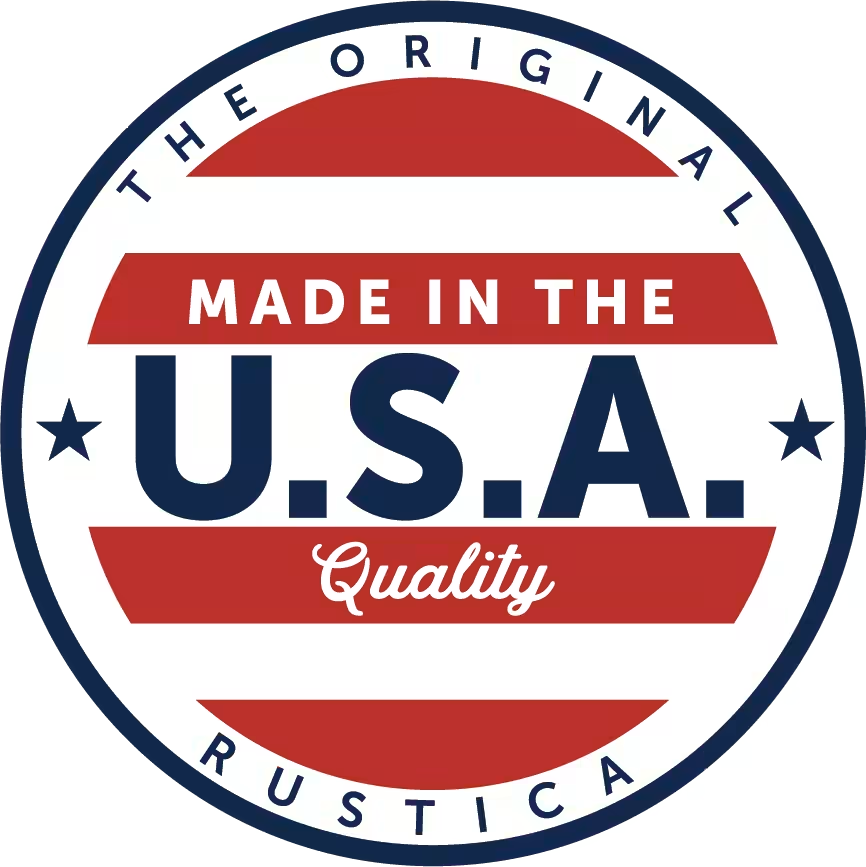1.800.891.8312
Free Shipping Details
Most orders over $500 qualify. Free shipping applies to Barn Door Hardware, Barn Doors, and Pocket Doors over $500.
Note: Front doors, interior doors, shower doors, any oversized door (wider than 3ft and taller than 7ft) and any special order doors have shipping costs calculated at checkout. Some barn door hardware track lengths do not qualify for free shipping.

Why Door Awnings Are a Smart Upgrade for Any Home
Tuesday, July 8th, 2025
Author: Kate Allen - Rustica Founder and CEO
Share
A door awning protects your entry from sunlight and bad weather. It also adds structure and definition to the front of your home. With the right size and material, it can improve comfort and reduce maintenance.
What Is a Door Awning?
A door awning is a cover installed above an exterior door to protect the entrance from rain, snow, and sunlight. It helps reduce water damage, keeps walkways safer, and adds a clean, finished look to your home’s entrance. Unlike window or patio awnings, these are designed specifically for doors, including front, back, or side entries.
Door awnings extend out from the wall or roof line, just under the rain gutter. They’re available in fixed or retractable styles and come in different shapes like curved, flat, or sloped. Most are made from metal, fabric, or polycarbonate, and they're designed to match a variety of home styles. While they look similar to window awnings, door models are purpose-built with added coverage and durability.
👉 Browse our selection of high-quality awnings.
Benefits of a Door Awning
Protection From Weather
A door awning blocks direct rain, snow, and hail from reaching your doorstep. It helps prevent water damage, reduces the chance of slips, and keeps your threshold dry.
Energy Savings
By shading the entryway, a door awning limits heat transfer through your door and helps lower indoor temperatures in warm seasons.
Longer Door Lifespan
Constant exposure to sunlight and moisture can cause wood to warp or paint to fade. Metal doors may rust over time. An awning helps reduce exposure and lowers the need for repairs or replacements.
Appearance
The right awning can give your home a more polished and welcoming look. It draws attention to the entryway and adds style without needing major renovations.
Comfort and Accessibility
A shaded, dry entry offers a more comfortable way to enter and exit the home. It can also improve safety for children, seniors, or anyone with mobility needs.
👉 Learn more about the benefits of awnings.
Types of Door Awnings
There are two main types of door awnings to consider. Each one offers different benefits depending on how much flexibility and coverage you want. Review both styles to see which one fits your home and routine best.
Fixed Door Awnings
Fixed awnings stay in place throughout the year. They are built from strong materials like aluminum or heavy-duty fabric and provide consistent coverage. This option works well in areas with stable weather and for homeowners who prefer a simple, long-term solution.
Retractable Door Awnings
Retractable awnings extend or fold away using a manual crank or motor. This allows more control over light and shade. They work well for homes that need seasonal flexibility but require more care, especially with motorized features.
Material Options
Metal (Aluminum or Steel)
Metal is strong, weather-resistant, and low maintenance. It holds up well to rain, wind, and sunlight but offers fewer color options.
Fabric
Canvas, acrylic, or polyester provide more color and texture options. Fabric awnings may fade or tear faster than metal but are easier to replace and refresh.
Polycarbonate
Polycarbonate awnings come in clear or tinted designs. They block UV rays while letting in natural light and work well for homes with a modern look.
What to Know Before Buying a Door Awning
Measure the Doorway
Correct measurements help the awning fit and perform as expected.
Width: Measure the full width of the door frame. Add 6 to 12 inches on each side for full coverage.
Projection: Measure how far the awning should extend from the wall. Most door awnings range from 24 to 48 inches.
Height Clearance: Make sure the awning sits at least 7 to 8 feet above ground level. This gives enough space to walk under it comfortably.
Measure everything twice to avoid mistakes. If your doorway has unique angles or trim, consider professional help. Many awnings come in custom sizes, so you can match them to your home’s exact layout.
Check Local Rules and HOA Guidelines
Before ordering, confirm if your city or neighborhood has installation rules.
Permits: Some areas require permits for any exterior additions, especially if the awning is large or attached to the home’s structure.
HOA Restrictions: If your home is in a neighborhood with a homeowners association, check for approved colors, materials, and styles.
Contact your local government or HOA board before finalizing the purchase.
Plan for Installation
Mounting Surface
The awning must attach to a sturdy wall, such as brick, stucco, or concrete. Weaker siding materials may need extra reinforcement to hold the weight.
Tools and Setup
Fixed awnings often need only basic tools like a drill, screws, anchors, and a level. Motorized retractable awnings may require electrical work, which should be handled by a licensed professional.
Safe Access
If the door is raised or located on a porch, plan for safe access to the installation area. You may need a ladder or scaffold, which can add to the cost.
Rustica Construction Standards
All Rustica awnings are engineered for long-term durability. Each one is built to handle daily exposure and provide a lasting upgrade to the entry.
Set Your Budget
Price by Material
Fabric: $150 to $400. Motorized versions may reach $600 or more.
Metal: $200 to $500. Premium finishes cost more.
Polycarbonate: $100 to $300. This option balances strength and price.
Installation Costs
Expect to pay $75 to $200 per unit for professional installation. Costs go up if the setup is complex or requires electrical work.
Plan to spend between $250 and $700 for each door, including installation. Focus on long-term value, not just the lowest price. High-quality materials often last longer and need less maintenance.
Choose Where to Buy
Where you buy your awning matters just as much as what you buy. A good supplier offers quality, support, and options that fit your needs. Look for a company that provides strong warranties, flexible customization, and a reliable reputation.
🛡️ Warranty
Good warranties range from 5 to 15 years for fabric. Some metal frames include lifetime coverage against rust or defects.
🎨 Customization
Make sure the supplier offers options that fit your door’s size, style, and color scheme.
⭐ Reputation
Read customer reviews for details on product durability and service quality.
Online retailers like Amazon and Awnings.com may offer fast shipping, while local vendors can provide hands-on guidance and installation support. Rustica offers both shipping and full customization.
Plan for Ongoing Care
Fabric
Clean with mild soap and water every six months. Check once a year for fading, stains, or small tears that may need repair or replacement.
Metal
Wipe down with a damp cloth as needed. Inspect for dents, rust spots, or loose hardware during seasonal changes.
Polycarbonate
Rinse with water to remove dirt and debris. Check for cracks or surface scratches that could affect appearance or performance.
How to Buy a Door Awning
Buying a door awning is simple when you take it one step at a time. Use this checklist to stay organized and avoid common delays or surprises.
Step 1: Set Priorities
Think about what matters most to you—shade, weather protection, style, or all three. This helps filter options quickly and keeps you focused during the search.
Step 2: Measure and Check Rules
Measure the full width, height clearance, and projection area around your door. Then contact your local government or HOA to confirm if there are size, style, or material restrictions in your area.
Step 3: Compare Options
Browse different materials like metal, fabric, and polycarbonate. Review fixed versus retractable models, and look at reviews to understand long-term durability and customer support.
Step 4: Order from Rustica
Use your measurements to request a custom quote directly from the Rustica team. You can shop and place your order online, with help available by phone, chat, or email if needed.
Step 5: Install
If you are comfortable using tools and the surface is easy to access, plan for a clear day and install it yourself. For more complex jobs, hire a qualified installer to complete the setup safely and securely.
Mistakes to Avoid
Small mistakes can cause bigger problems later. Review these issues ahead of time to make a smarter choice and get better results.
Choose the Right Size
An awning that is too small will not provide full coverage. Oversized models can overwhelm the space or require permits. Always measure carefully and confirm sizing before you order.
Match the Material to the Weather
Fabric may sag or tear in strong winds or heavy snow. In areas with extreme weather, use metal or polycarbonate for better strength and durability.
Prepare Properly for Installation
Improper mounting can damage your siding or lead to long-term issues. Prep the surface, use proper hardware, and follow all steps in the instructions. Hire a professional for complex jobs.
Pick the Right Material
Not all materials perform the same. Fabric may require more upkeep and fade in direct sun. Metal is strong but may dent. Polycarbonate can scratch. Choose based on your climate and design preferences.
Angle the Awning for Proper Drainage
A flat awning can trap rain or snow. Use a model with a built-in slope to allow runoff and avoid damage.
Block the Right Sunlight
Place the awning to shield your door during peak daylight hours. Direct afternoon sun can limit the cooling effect and shorten the material's lifespan.
Mount with Enough Clearance
Install the awning high enough for people, packages, and fully open doors to pass underneath without obstruction.
Is a Door Awning Right for Your Home?
A door awning can protect your entryway, reduce maintenance, and add visual appeal. With the right measurements, proper installation, and a material that fits your climate, the upgrade can last for years.
If you are ready to move forward, start by measuring your doorway and choosing a style that fits your goals. Our team is here to help—contact us by phone, email, or chat with questions or to request a quote.
Rustica is a family business, and we take pride in helping each customer find the right fit for their space. Every project is unique, and we are happy to guide you through it.



Hitching Post
Event Venue
1520 N Main Street
Springville UT 84663
PRODUCTS
FEATURES
COMPANY
BUSINESS



